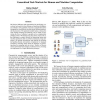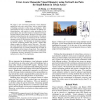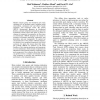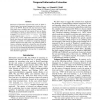AAAI
2010
14 years 1 months ago
2010
Activity recognition based on data from mobile wearable devices is becoming an important application area for machine learning. We propose a novel approach based on a combination ...
AAAI
2010
14 years 1 months ago
2010
We discuss challenges and opportunities for developing generalized task markets where human and machine intelligence are enlisted to solve problems, based on a consideration of th...
AAAI
2010
14 years 1 months ago
2010
We consider the task of assigning experts from a portfolio of specialists in order to solve a set of tasks. We apply a Bayesian model which combines collaborative filtering with a...
AAAI
2010
14 years 1 months ago
2010
We report a new error-aware monocular visual odometry method that only uses vertical lines, such as vertical edges of buildings and poles in urban areas as landmarks. Since vertic...
AAAI
2010
14 years 1 months ago
2010
Intentions have been widely studied in AI, both in the context of decision-making within individual agents and in multiagent systems. Work on intentions in multi-agent systems has...
AAAI
2010
14 years 1 months ago
2010
The behavior of a complex system often depends on parameters whose values are unknown in advance. To operate effectively, an autonomous agent must actively gather information on t...
AAAI
2010
14 years 1 months ago
2010
Computer agents are increasingly deployed in settings in which they make decisions with people, such as electronic commerce, collaborative interfaces, and cognitive assistants. Ho...
AAAI
2010
14 years 1 months ago
2010
Recent advancements in model-based reinforcement learning have shown that the dynamics of many structured domains (e.g. DBNs) can be learned with tractable sample complexity, desp...
AAAI
2010
14 years 1 months ago
2010
Modern complex games and simulations pose many challenges for an intelligent agent, including partial observability, continuous time and effects, hostile opponents, and exogenous ...
AAAI
2010
14 years 1 months ago
2010
Research on information extraction (IE) seeks to distill relational tuples from natural language text, such as the contents of the WWW. Most IE work has focussed on identifying st...




